Introduction
In the rapidly evolving landscape of retail, businesses are confronted with unprecedented challenges that demand immediate and strategic responses. As consumer preferences shift and technological advancements reshape the marketplace, the importance of effective restructuring cannot be overstated. Organizations must not only adapt to these changes but also harness them to drive operational efficiencies and financial stability.
With bankruptcy filings on the rise and economic pressures mounting, CFOs are tasked with navigating a complex environment that requires a proactive approach to restructuring. This article delves into the essential strategies and insights that empower retail leaders to revitalize their operations, engage stakeholders, and implement data-driven solutions that pave the way for sustainable growth in 2024 and beyond.
Introduction to Retail Restructuring Consulting
Retail restructuring consulting encompasses specialized services tailored for businesses facing financial challenges and operational inefficiencies, including interim management services and bankruptcy case management. As we move into 2024, organizations must navigate a landscape characterized by shifting consumer preferences, increased competition, and rapid technological advancements. For instance, AI-generated product recommendations are pivotal, influencing 35% of Amazon's sales, underscoring technology's role in modern retail strategies.
According to economist Akrur Barua, two critical trends shaping the future commercial landscape are tighter labor markets and elevated long-term interest rates. The US Economic Forecast case study further highlights that while the economy has evaded recession, consumer spending may decline in 2024-2025 due to reduced personal savings and economic pressures. In this context, the need for companies to engage in retail restructuring consulting becomes clear.
By engaging in a thorough financial assessment, our consultants help organizations preserve cash and reduce liabilities, fostering operational efficiency. Our collaborative approach is rooted in core values of transparency, results, and innovation, enabling us to create data-driven solutions that reinforce strengths and streamline decision-making processes. Through our client engagement process, which includes:
- A comprehensive organizational review
- The 'Identify & Plan' phase
- Strategic planning
we empower organizations to test hypotheses, make quick decisions using real-time analytics, and operationalize lessons learned.
The objective is to master the cash conversion cycle, applying effective methods that improve overall performance. As demonstrated by the expertise showcased in reports like Nicole's Colliers U.S. In retail restructuring consulting, successful restructuring is not merely a reactive measure; it is a proactive approach that revitalizes business models, equipping them to thrive in an increasingly complex marketplace.
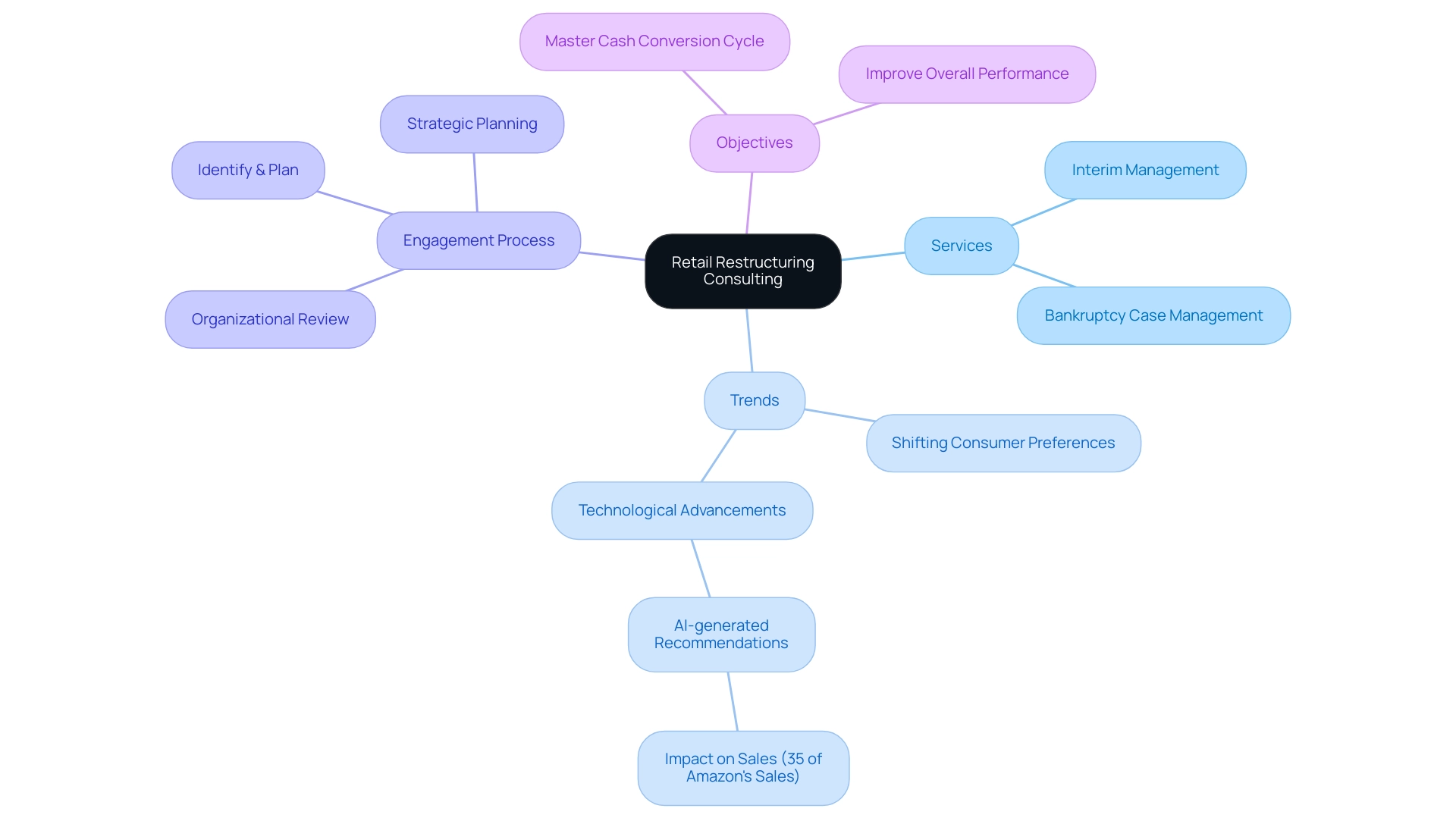
Key Strategies for Effective Retail Restructuring
- Conduct a Comprehensive Financial Assessment: Begin by performing a thorough analysis of financial statements to uncover inefficiencies and potential savings. This assessment should encompass cash flow analysis, a detailed evaluation of the cost structure, and a review of profitability metrics, all crucial for mastering the cash conversion cycle. By identifying these areas, CFOs can develop targeted strategies that bolster financial health amidst increasing bankruptcy filings—projected to reach approximately 507,000 by year-end 2024, reflecting an 18.8% increase over the previous year. This process aligns with the 'Identify & Plan' methodology in retail restructuring consulting, effectively addressing underlying issues.
- Implement Operational Changes: Streamlining operations is essential for driving efficiencies. Focus on enhanced supply chain management, optimizing inventory levels, and boosting workforce productivity. Utilizing technological solutions that back these initiatives is crucial for attaining operational excellence and adjusting to changing buyer behaviors, as demonstrated during the 'Retail Apocalypse' from 2017 to 2020, when numerous retailers found it challenging to keep up with industry shifts. Real-time analytics can facilitate this process, enabling better decision-making and performance monitoring, thereby supporting the 'Test & Measure' approach to maximize returns on investment.
- Revise Business Strategy: Reassess your positioning, target audience, and product offerings to ensure alignment with contemporary consumer trends. This may require a shift toward e-commerce approaches or diversification of product lines to capture new market segments. Notably, bankruptcy can provide retailers a second chance for retail restructuring consulting to reinvent themselves for future success, increasingly relevant as bankruptcy cases continue to reshape the retail landscape. Continuous business performance monitoring will help operationalize turnaround lessons during this strategic revision, reinforcing the need for ongoing assessment and adjustment.
- Engage Stakeholders: Cultivating open channels of communication with key stakeholders—including employees, suppliers, and investors—is vital. Their insights can yield valuable perspectives on potential changes and improvements, fostering a collaborative atmosphere that enhances efforts in retail restructuring consulting. As highlighted by a Reuters quote regarding the Toys R Us bankruptcy, the dynamics between retailers in Chapter 11 and their suppliers have evolved, necessitating greater transparency and trust as vendors become more cautious than before.
- Monitor and Adjust: Establish clear metrics to evaluate the effectiveness of your restructuring initiatives. Consistently assess and enhance approaches based on performance results to guarantee ongoing advancement. This iterative process is essential in light of the projected annual growth in bankruptcy filings of 3-5% through 2027, driven by ongoing economic pressures such as rising household debt and wage stagnation. The long-term projections for bankruptcy filings further emphasize the importance of adapting strategies in response to these trends, ensuring that CFOs are equipped to navigate the complexities of corporate restructuring.
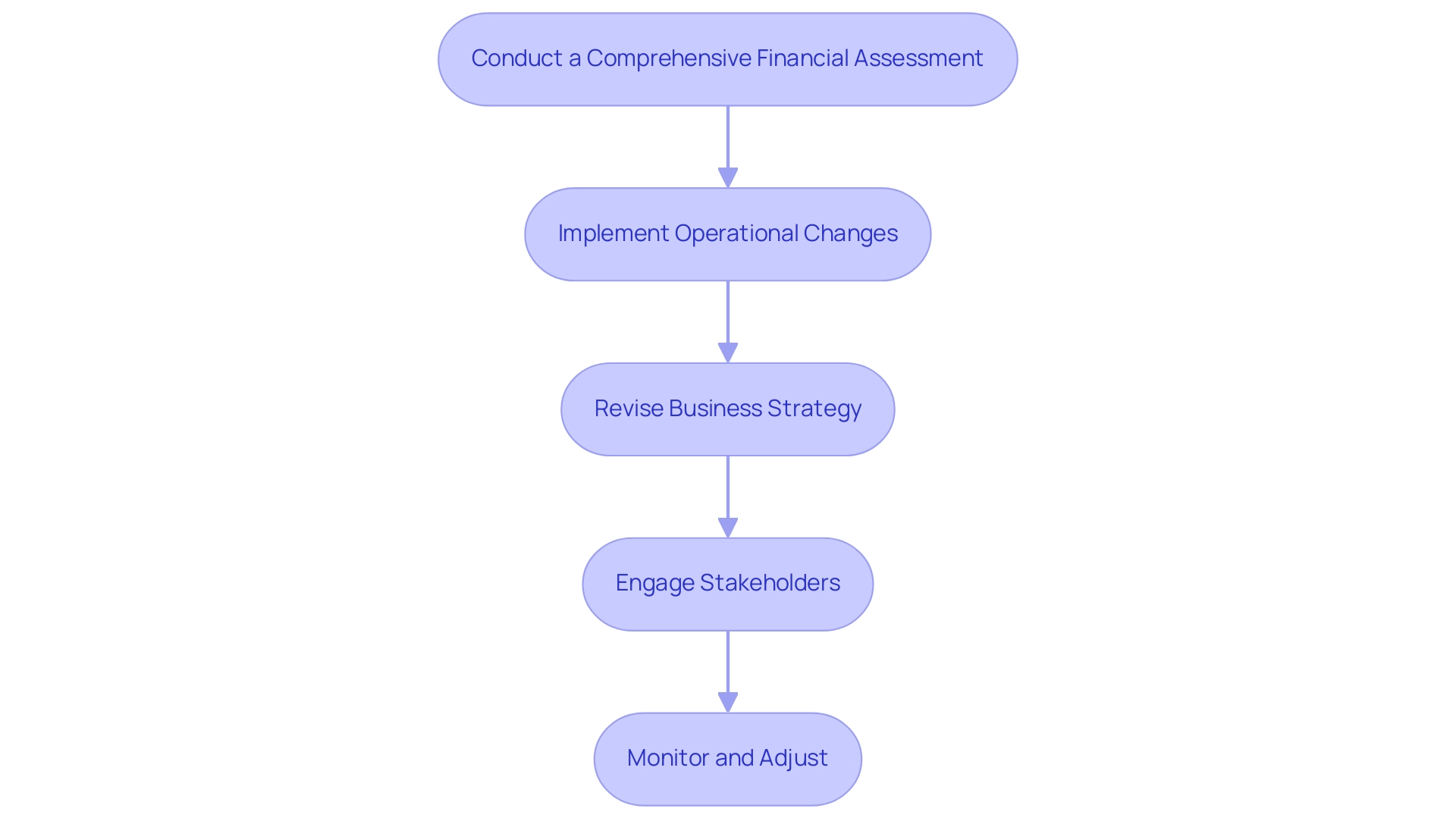
Challenges and Pitfalls in Retail Restructuring
-
Lack of Clear Objectives: Restructuring initiatives often flounder without well-defined goals. Establishing specific, measurable objectives is essential to guide the process and ensure alignment across the organization.
-
Ineffective Communication: Poor communication with stakeholders can foster resistance and confusion, undermining restructuring efforts. It's vital to maintain transparent and consistent messaging throughout the process. As Steve, Managing Director at Deloitte's Consumer Industry Center, emphasizes, effective communication is crucial for navigating these challenging transitions. Moreover, with over $2B spent annually on collaboration beyond traditional trade funds and retail media, the financial implications of effective communication cannot be overstated. Our team advocates for a shortened decision-making cycle, enabling your organization to take decisive action, maintaining integrity through real-time analytics that track success and offer actionable insights.
-
Underestimating Resource Needs: A frequent pitfall in restructuring is the failure to allocate adequate resources—both financial and human. Insufficient planning can lead to incomplete or unsuccessful initiatives. Anticipating and planning for resource allocation is crucial for setting initiatives up for success. By utilizing our client dashboard, you can continuously monitor organizational health, ensuring that resource allocation aligns with your strategic objectives. For instance, our analytics tool can track resource utilization in real-time, allowing for swift adjustments to meet evolving demands.
-
Failure to Engage Employees: The involvement of employees is critical to the success of any restructuring effort. Neglecting to engage them can result in low morale and decreased productivity. Engaging employees early in the process and actively seeking their input fosters a collaborative environment that can drive positive outcomes.
-
Neglecting Market Trends: Restructuring efforts can easily derail if businesses ignore changes in buyer behavior and market dynamics. Staying informed about industry trends enables companies to adjust their approaches proactively. According to Deloitte economists, the current economic conditions reveal that despite inflation dropping, consumer spending may face challenges due to high rents and rising house prices. This underscores the significance of incorporating insights from the US Economic Forecast case study into restructuring plans. Additionally, Clarke concludes that leveraging data enhances customer experience, improves decision-making and efficiency, and provides companies with greater agility and scalability, emphasizing the need for businesses to remain responsive to trends. Ongoing performance monitoring via real-time analytics not only guides planning but also fosters enduring relationships with stakeholders, which is crucial for a successful turnaround. By utilizing our real-time analytics, companies can swiftly adapt their approaches in response to market changes, ensuring they remain competitive.
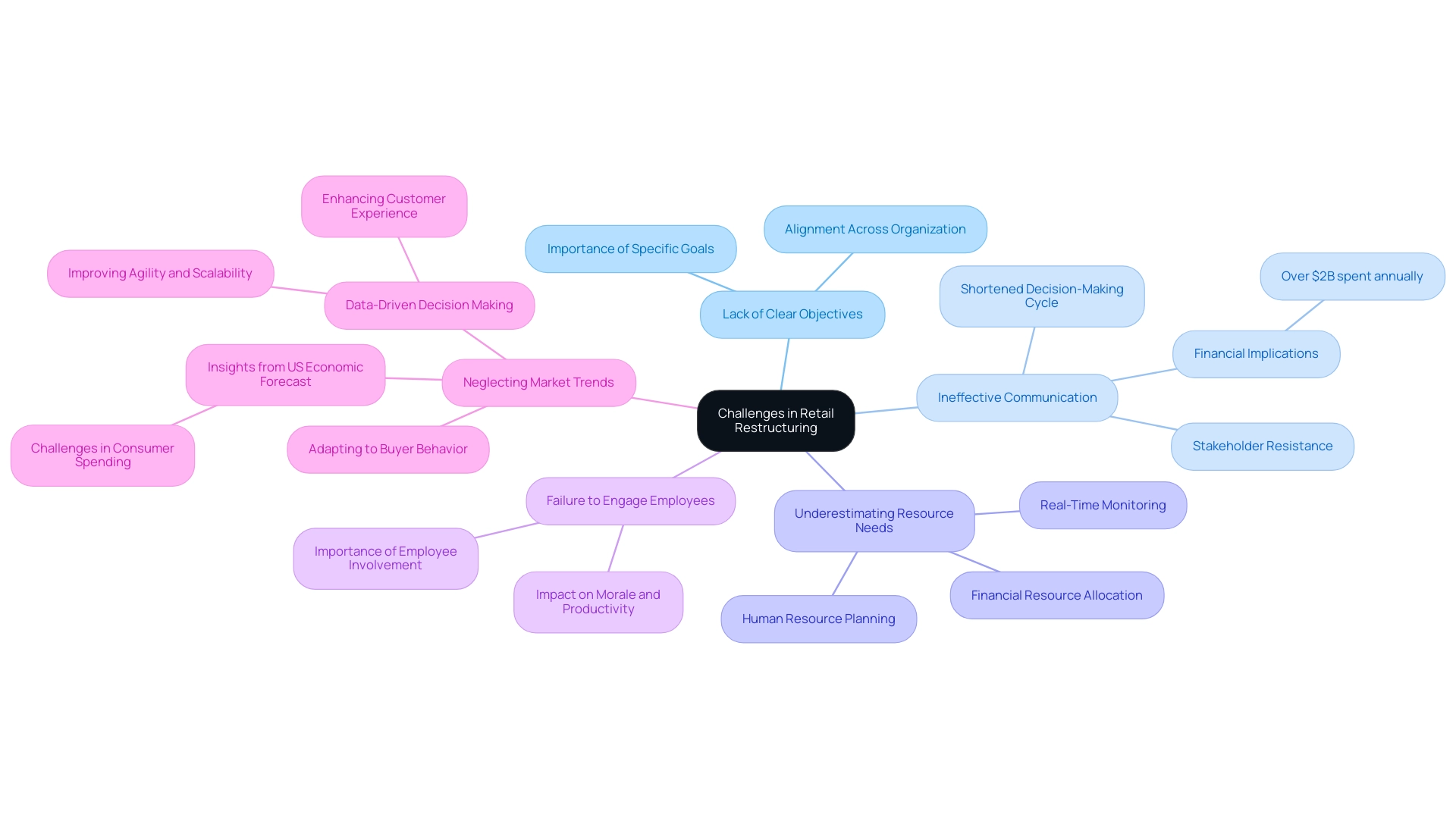
The Role of Consulting Firms in Retail Transformation
Consulting firms are instrumental in driving corporate restructuring and turnaround strategies through retail restructuring consulting, offering specialized expertise, resources, and objective insights crucial for today's competitive landscape. Their emphasis on streamlined decision-making and real-time analytics is crucial for CFOs aiming to enhance operational performance.
Successful case studies illustrate the impact of consulting on strategic organizational improvement:
- Operational Overhaul: A leading national retail chain partnered with a consulting firm specializing in retail restructuring consulting to enhance its supply chain processes, achieving a remarkable 20% reduction in operational costs alongside improved inventory turnover. This operational efficiency directly contributes to better investment returns through rigorous testing of operational hypotheses.
- Digital Transformation: In response to shifting consumer behaviors post-COVID-19, a traditional retailer enlisted consultants to implement a robust e-commerce platform. This strategic move resulted in a staggering 50% increase in online sales within the first year, highlighting the necessity of adapting to the digital marketplace. As noted by WARD,
> 64% of marketers are prioritizing improvements in the online customer experience, underscoring the urgency for organizations to elevate their digital strategies. Predictions indicate that by 2027, more than 50% of enterprises will adopt industry cloud platforms, reinforcing digital transformation as a critical focus for retailers, highlighting the importance of retail restructuring consulting. - Workforce Optimization: A hospitality company partnered with consultants to revamp its employee training programs, leading to a notable rise in employee engagement and customer satisfaction ratings. This case emphasizes how investing in workforce development can significantly enhance service quality while operationalizing lessons learned from previous experiences. The consulting firm continually monitored the effectiveness of the training through real-time analytics, allowing for necessary updates and adjustments to the program.
With more than 52% of companies with revenues exceeding $1 billion currently engaged in digital transformation, the demand for skilled professionals to lead these initiatives is growing. Over the last five years, digital transformation roles have surged, forecasting approximately 4 million new digitally enabled positions across various industries. This trend highlights the critical need for skilled professionals to drive transformation in the digital age. By collaborating with consulting firms, CFOs can effectively navigate complex challenges, leverage emerging technologies such as AI for data analysis, and emerge stronger in a rapidly changing environment.
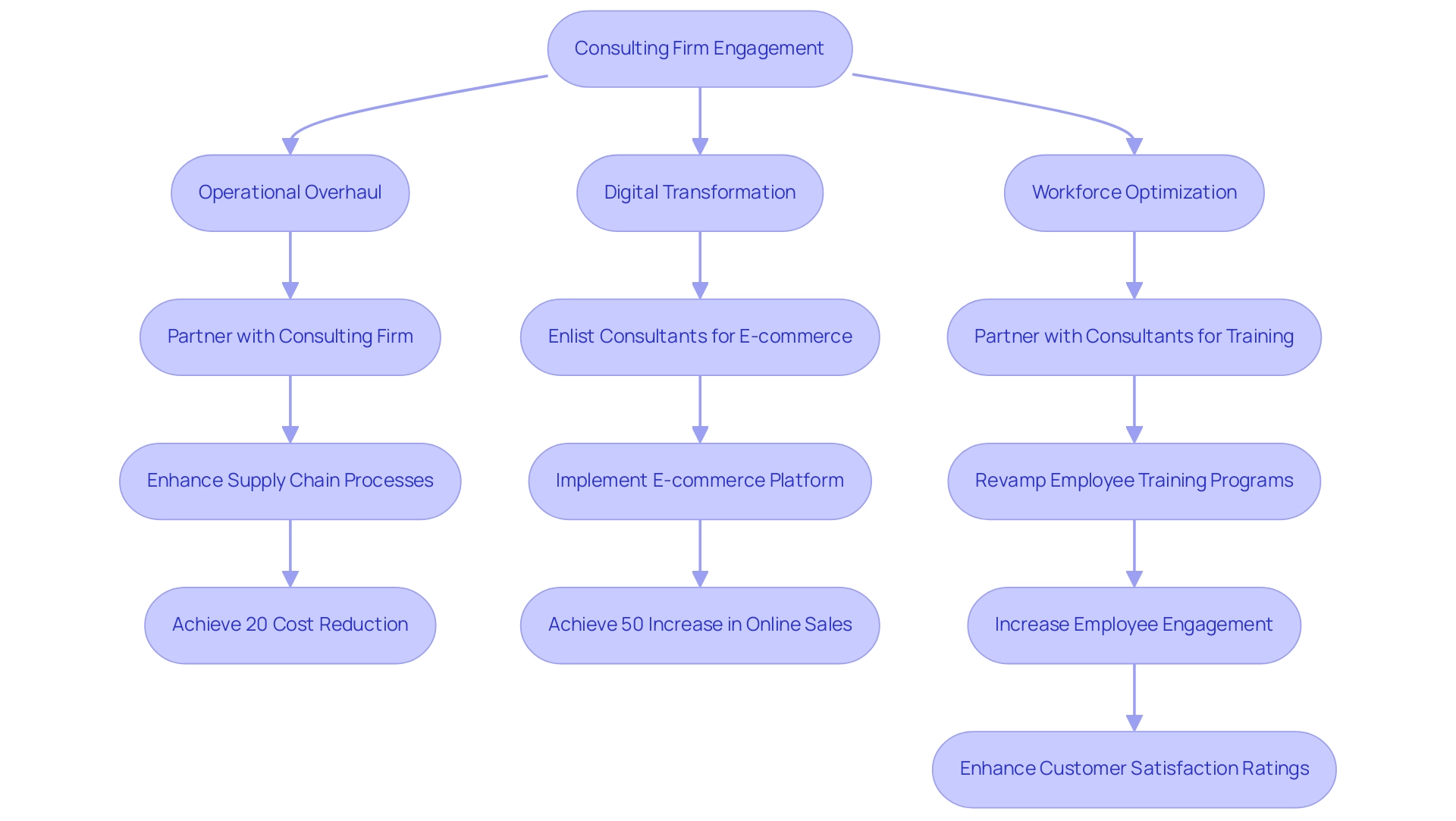
Future Trends in Retail Restructuring Consulting
-
Integration of Technology: The consulting landscape is witnessing a seismic shift with the integration of AI and data analytics, fundamentally altering how insights are delivered. As firms increasingly rely on data-driven decision-making, restructuring efforts will become more precise and effective, particularly through the use of AI and machine learning to revolutionize operations. This trend is crucial for CFOs seeking to utilize technology for competitive benefit, enabling efficient decision-making and real-time analytics that aid in business turnaround plans. Notably, a small segment of shoppers (20%) is embracing emerging technology for retail assistance, particularly high-earning individuals interested in wellness products, indicating a growing market for tech-assisted shopping options. To explore these transformative strategies further, consider our promotional guide, 'Revolutionizing Operations With AI & Machine Learning - An Operators Guide,' now available for $399.00, down from $999.00.
-
Sustainability Focus: With sustainability becoming a top concern for shoppers, retail restructuring consulting firms are now essential in guiding retail enterprises toward eco-friendly practices without compromising profitability. This alignment not only meets customer expectations but also enhances brand loyalty, as individuals are willing to seek alternatives if their values are not upheld.
Personalized Consulting Solutions: The future of consulting is moving towards bespoke solutions tailored to the unique needs and challenges of each business. This shift away from generic approaches allows consultants to address specific pain points and opportunities, delivering greater value to clients. As Shawn Nelson, Founder and CEO of Lovesac, notes,
Understanding buyer behavior is critical in this evolving landscape,
highlighting the necessity for personalized strategies. The aforementioned statistic about tech-savvy consumers underscores the importance of adapting consulting practices to meet the demands of this segment.
-
Agility and Resilience Strategies: In an ever-changing market, building agile models is imperative for retailers. Consulting firms focused on retail restructuring consulting will play a crucial role in facilitating this transformation, helping organizations adapt swiftly to new challenges and capitalize on emerging opportunities. This agility is essential for maintaining competitive advantage in a dynamic environment, as highlighted in the 2024 Consumer Products Industry Outlook, which discusses trends and strategies for growth. Our 'Decide & Execute' and 'Update & Adjust' methodologies empower organizations to make informed decisions and continuously monitor their performance.
Enhanced Collaboration: The future of retail consulting will increasingly involve collaborative partnerships between firms and businesses. This approach fosters innovation and growth, allowing for shared insights and resources that drive more effective solutions. As the market evolves, such collaborations will be key to navigating complexities and achieving long-term success.
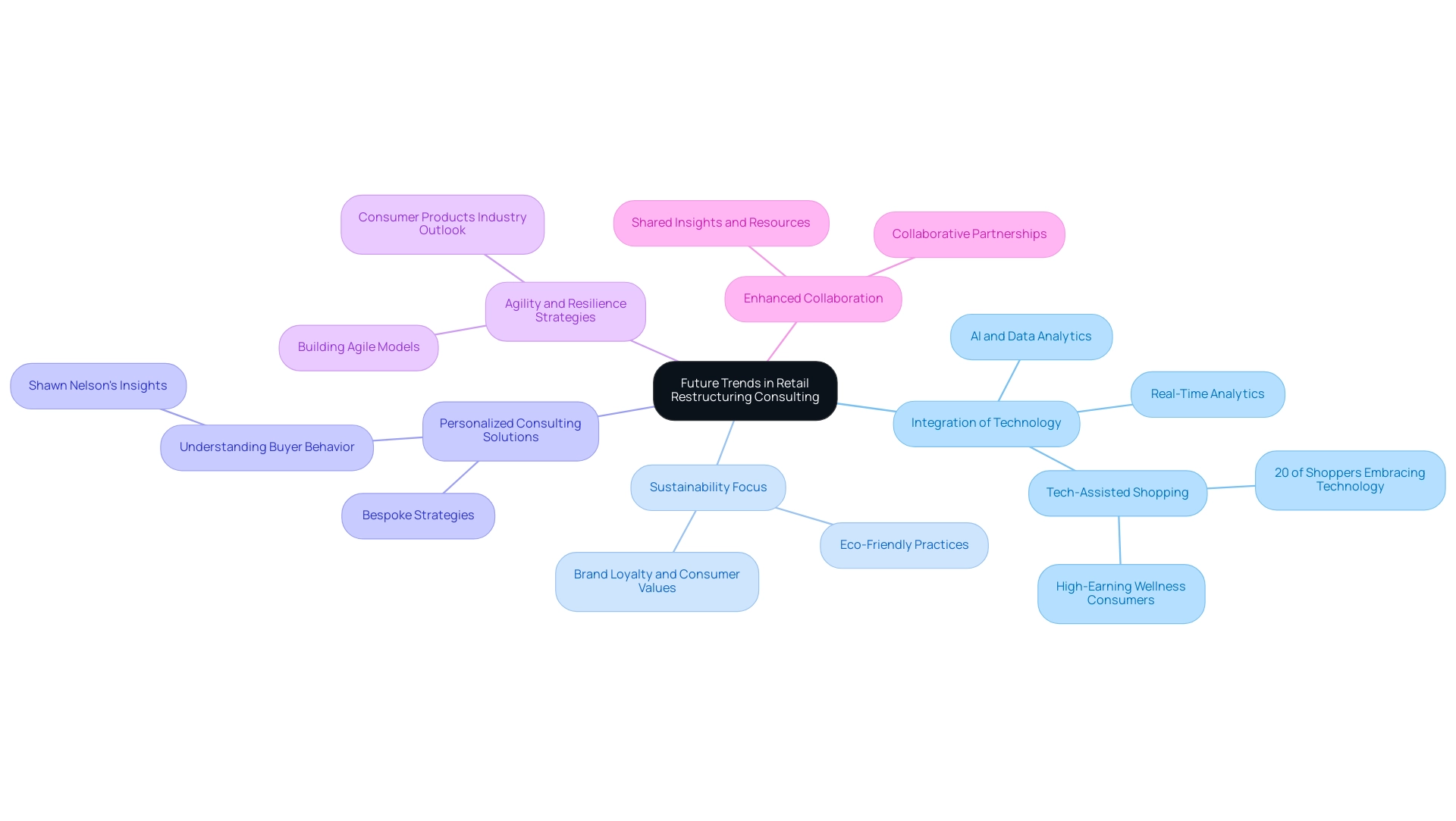
Conclusion
Navigating the complexities of retail restructuring is essential for businesses aiming to thrive in an ever-evolving marketplace. Key strategies such as:
- Conducting comprehensive financial assessments
- Implementing operational changes
- Revising business strategies
are fundamental for enhancing efficiency and adaptability. Engaging stakeholders and fostering open communication further solidify these efforts, ensuring that all parties are aligned and invested in the transformation process.
However, organizations must remain vigilant against common pitfalls, including:
- The lack of clear objectives
- Ineffective communication
By establishing measurable goals and maintaining transparent dialogue, businesses can mitigate resistance and drive successful restructuring initiatives. Continuous monitoring and adjustment of strategies based on real-time analytics will enable CFOs to respond proactively to market changes, ensuring long-term sustainability amidst economic pressures.
Looking ahead, the integration of technology, a focus on sustainability, and the need for personalized consulting solutions will shape the future of retail restructuring. As consulting firms play an increasingly pivotal role, their expertise in facilitating agility and resilience will be crucial for organizations seeking to maintain a competitive edge. Embracing these trends will empower retail leaders to not only survive but also thrive in the dynamic landscape of 2024 and beyond, positioning their businesses for success in an uncertain economic environment.
Frequently Asked Questions
What is retail restructuring consulting?
Retail restructuring consulting involves specialized services designed for businesses facing financial challenges and operational inefficiencies, including interim management and bankruptcy case management.
What are the current trends affecting retail businesses in 2024?
Key trends include tighter labor markets, elevated long-term interest rates, shifting consumer preferences, increased competition, and rapid technological advancements such as AI-generated product recommendations.
How does retail restructuring consulting help companies?
Consultants perform thorough financial assessments to preserve cash, reduce liabilities, and enhance operational efficiency, allowing organizations to navigate financial challenges effectively.
What is the 'Identify & Plan' phase in retail restructuring consulting?
The 'Identify & Plan' phase involves a comprehensive organizational review and strategic planning to empower organizations to test hypotheses and make quick decisions using real-time analytics.
What are the objectives of retail restructuring consulting?
The main objective is to master the cash conversion cycle and apply effective methods to improve overall performance and business models, enabling companies to thrive in a complex marketplace.
What steps should companies take for effective retail restructuring?
Companies should conduct a financial assessment, implement operational changes, revise their business strategy, engage stakeholders, and monitor and adjust their initiatives based on performance metrics.
Why is stakeholder engagement important in retail restructuring?
Engaging stakeholders fosters open communication and collaboration, providing valuable insights that can enhance restructuring efforts and build trust, especially in light of evolving dynamics between retailers and suppliers.
What is the significance of monitoring and adjusting restructuring initiatives?
Continuous monitoring and adjustment are crucial for evaluating the effectiveness of restructuring efforts, ensuring ongoing improvement and adaptability to economic pressures and changing market conditions.




